Thousands march against Bill 96 in student-led protest
As Bill 96 is closer to becoming law, demonstrators are making the final push to get their voices heard
Protesters from various schools, generations, and community groups participated in a peaceful protest to denounce Bill 96—the controversial bill aiming to enforce stronger protections for the French language, even at the detriment of anglophone and allophone services in Quebec.
English-language groups hosted the protest in front of Dawson College to show their frustration, as well as their unity towards overturning the bill. Among the demonstration’s hosts were the Quebec Community Groups Network, English Parents’ Committee Association, Quebec English School Board Association, the Quebec Federation of Home and School Associations, and other student associations.
The protest began on the Dawson campus and made its way to Quebec Premier François Legault’s downtown office near McGill University on May 14. Demonstrators demanded the bill be overturned before it is voted on in early June.
Since it was tabled in May of 2021, the bill raised citizens’ concerns surrounding shifts in the curriculum of English CEGEPs. If the bill passes, students would be required to attend three additional French-language courses and complete a five-hour exit exam. The bill would limit student admissions by 17.5 per cent, placing a major burden on English CEGEPs.
The Canadian government had a policy at one time [for] assimilation: ‘kill the Indian to save the man.’ Quebec now has the policy to ‘kill the Indian to save the French language. — Kenneth Deer
Legault stated this bill is to protect and promote the French language. Advocacy groups such as QCGN said the bill does not only target anglophones, but also allophones, francophones and Indigenous communities by enhancing division amongst these groups. Due to this backlash, Legault vowed to protect the rights of anglophones.
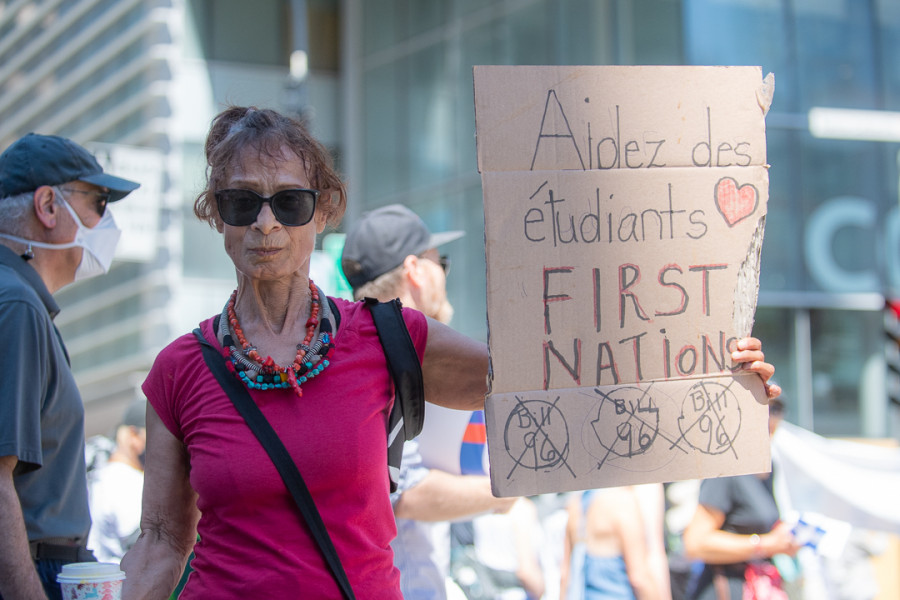
The demonstrators, mostly high school and CEGEP students, funneled their way through Dawson’s front gates on Saturday morning. Volunteers set up sound systems and a table with snacks, drinks, flags of Canada, Quebec and Montreal, and anti-Bill 96 merchandise for protesters to grab on the go.
Dawson Student Union president Alexandrah Cardona said she was humbled by the high turnout of protestors from the city and nearby regions. She added that she hopes Legault and his cabinet will directly respond to the students’ concerns.
“He really downplayed those concerns including the use of the notwithstanding clause and lack of consultations with students. We still don't have directives from the ministry of education, as far as students are concerned,” Cardona said. She demanded more transparency from Simon Jolin-Barrette, the minister of the French language, and from Danielle McCann, the minister of Education.

QCGN president and former Liberal Member of Parliament Marlene Jennings opened up the stage for speakers from various organizations, including Vanier College Student Association and McGill Faculty of Law.
The speeches began with a land acknowledgement. Dawson student Rotshennón:ni Two-Axe recited the Ohèn:ton Karihwatéhkwen, an opening address in the Mohawk language.
Indigenous community members were present as well, with Mohawk Kahnawà:ke Elder Kenneth Deer mentioning the imperialist nature behind Bill 96. “The Canadian government had a policy at one time [for] assimilation: ‘kill the Indian to save the man.’ Quebec now has the policy to ‘kill the Indian to save the French language,’” he said.
Indigenous leaders requested the provincial government exempt their communities from Bill 96, fearing it would cause additional barriers to job opportunities for younger generations. Some leaders labelling the bill as one more form of cultural genocide. The original language of this land is neither French nor English. Imposing to Indigenous students learning a potential third language to access post-secondary education would undermine their academic success.
Gracie Diabo, an Indigenous student from Kahnawà:ke and academic vice-president of the Student Union of John Abbott College, said the bill could delay her chances of graduating and succeeding in the future.
“It’s already hard enough to regain and learn our own language. Having to prioritize learning French over our own language is really difficult,” she said. “We almost see it as a second colonization of our people because of that.”
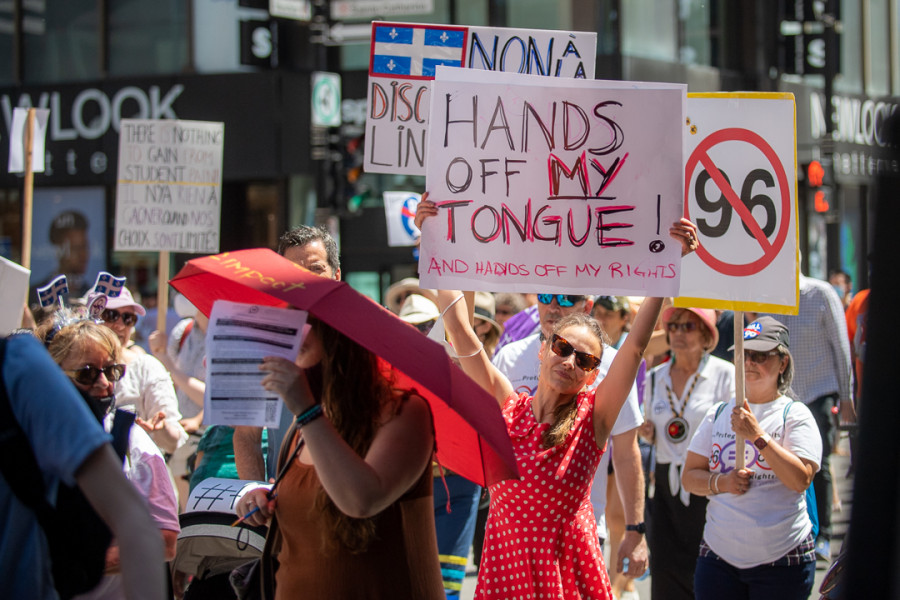
Vanier College Student Association president Isabella Giosi said the provincial government should provide assistance to all students, regardless of their linguistic background. “What I want the government to know is that English CEGEPs are not the enemy,” Giosi said.
West Island College student Yianni Vounasis said that not only would Bill 96 impact his education but also his family’s access to public services. “It would affect my family members because their first language isn’t French, so they wouldn't be served in the language they feel comfortable in, especially in hospitals. [...] I understand that protecting the language is important, but all languages are important as well,” he said.
We almost see it as a second colonization of our people. — Gracie Diabo
The bill would give immigrants and refugees 6 months to learn French in order to maintain access to health services and other public services, as English services will be only offered within their first 6 months in the province. Doctors would be obliged to address their patients in French, whereas historic anglophones receive care in English.
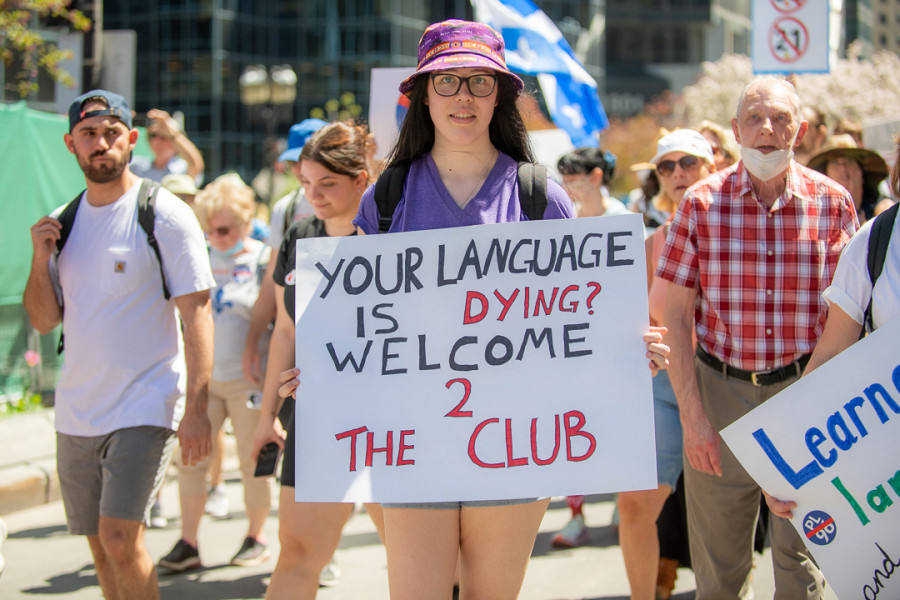
Federal politicians were also present at the protest to show support, including Liberal MPs Sameer Zuberi and Francis Scarpaleggia, representing the Pierrefonds-Dollard and Lac-St-Louis ridings respectively. Former Montreal mayoral candidate Balarama Holness said the protest is “what democracy should look like.”
Holness is hoping the provincial government listens to the needs of all Quebecers, specifically Montrealers. “I think that Montrealers, and particularly people who care about language and privacy rights—we’re on our last breath,” he said. “We need to have someone at the National Assembly [who’s] going to fight for us and represent us.”
Holness announced he was leaving municipal politics on April 20, declaring the formation of a new party, Mouvement Québec. He intends on running in the upcoming provincial elections in October 2022.
When Marlene Jennings introduced Quebec Liberal Party leader Dominique Anglade, she was met with boos. One protester called Anglade a sellout because the party had drafted and voted for Bill 96 back in February. After discussions with anglophone community members, the Liberal party withdrew its statement on the bill in April, saying it would “put English-speaking students at risk.”
By 11 a. m., demonstrators poured out of the Dawson main entrance and marched from Atwater Ave. to De Maisonneuve Blvd. and Ste-Catherine St., chanting slogans in both French and English.
As demonstrators reached McGill’s front entrance on Sherbrooke St. West, they were met with counter-protestors playing various musical instruments, singing and holding a banner saying “Pour l’amour du français, pour la suite du monde.”
The protest remained peaceful, followed by a heavy police presence which included cars,motorcycles and officers on horseback. The crowd dissipated at around 1 p.m.
Read the French version translated by The Link here.
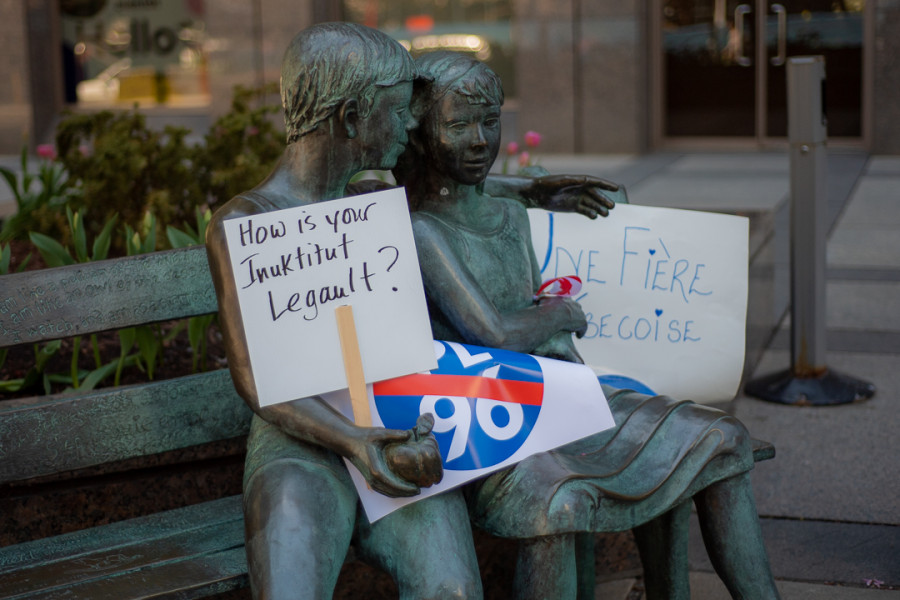



2_600_375_90_s_c1.jpg)
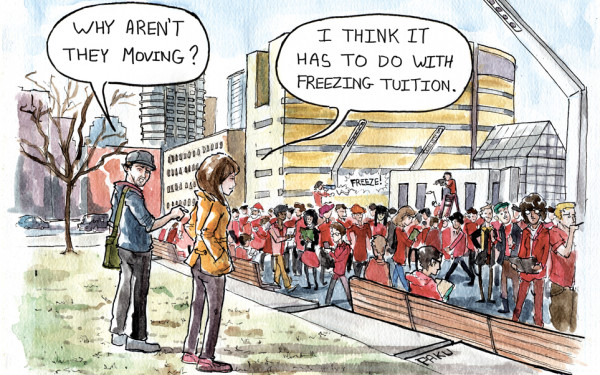
05_600_375_90_s_c1.jpg)
